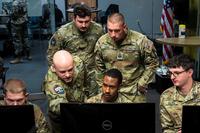In 2018, the health-care industry surpassed retail and became the largest employment sector in the United States, according to the Bureau of Labor Statistics, with an estimated two million more jobs coming by 2028.
Now, officials at an education platform for health-care careers called Carrus want to help fill those jobs with veterans and military spouses -- at no cost.
"We find that some of our best learners and our most successful learners actually have military backgrounds," Carrus CEO Misty Frost told Military.com. "So we've decided as a company to really not only continue our investment in training military personnel and their spouses, but really try to consciously grow that opportunity with them."

Frost says Carrus is particularly interested in veterans and their families because they are well-versed in "soft" skills. Those are skills such as effective communication, interacting with patients and showing up to work on time that make a workplace run well. Everything else can be taught.
"Veterans have a somewhat unique advantage over the non-military folks who enter these careers for the first time," Frost says.
And health-care jobs are uniquely suited to military spouses, she said. That population needs the flexibility to move, but also requires a valuable skill that is marketable anywhere. Health-care jobs allow for just that kind of demand and flexibility.
Health care doesn't necessarily mean "doctor," although that's also a career in the field. Thanks to the growth of the industry, there is an increased demand for the support that doctors and other clinicians need to keep hospitals and practices running, Frost says. Those are jobs such as medical assisting, medical transcription, medical coding and billing, dental assistants, pharmacy technicians, surgical techs and more.
Thanks to a grant from the Army Credentialing Assistance Program (ACA), Carrus officials are looking to expand their training of spouses and military members with its no-cost, short-term training program that has an employment rate of around 80%. Frost says it's a training and certification program anyone can take, even if their day job is turning the wrenches on an F-35.
And they've already got a good track record. Even before receiving the grant, they had already trained 20,000 military spouses in health-care careers.
So what's the catch? Anyone entering the training is working on their own initiative, as the training program is self-directed. These skills are real, marketable skills and it takes effort to learn them. Also, while the training can be done in 4-6 months, most people in the program take up to a year, because life happens -- especially when part of a military family.

"You definitely have to put in the effort to get there and finish the program," Frost says. "Not everyone is successful because it sounds like a magical thing. It's a great program, but you have to get in and do the work."
Just because the training program is funded by an Army grant doesn’t mean it’s limited to Army personnel, officials said. Carrus is offering the program through its CareerStep Division, and all a service member needs to do to qualify is be eligible for their branch’s tuition assistance program.
Spouses can also receive funding through the My Career Advancement Account Scholarship Program, which provides up to $4,000 of financial assistance to eligible military spouses pursuing a portable career grant. To learn more about the MyCAA grant and how it can fund this training, visit the MyCAA website at MilitaryOneSource.
Any military member or spouse interested in free training for a new career in the health-care industry should visit CareerStep.com's Military Page to find out more and sign up for more information in the “request info” area of the page.
Want to Know More About Veteran Jobs?
Be sure to get the latest news about veteran jobs, as well as critical info about veteran jobs and all the benefits of service. Subscribe to Military.com and receive customized updates delivered straight to your inbox.
















